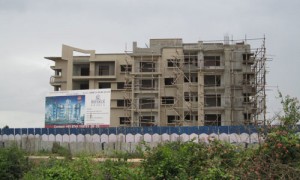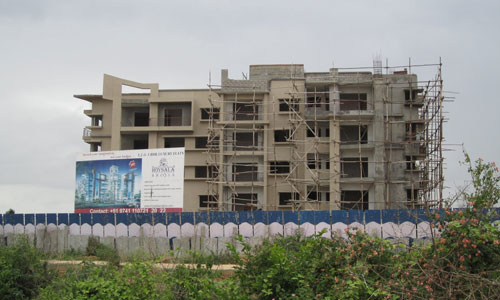Bottom Line: To evade the project delays and avoid over-priced ready-to-move apartments many of the home buyers now opt for resale property that is under-construction. Track2Realty goes through the processes of the property transaction in this market to create a check list for the buyers that ensure they are not caught in the grey zone and verification gets easier.
 New launches are risky for an average home buyer in an age of non-compliance of project timelines; ready-to-move has its additional cost burden and often cash component is being demanded. Hence, many of the end users look for under-construction properties in the resale market. This may sound to be a win-win situation for both the first buyers (as he books his profit) and the second buyers who ensures with the construction progress that he will get his apartment within an expected time.
New launches are risky for an average home buyer in an age of non-compliance of project timelines; ready-to-move has its additional cost burden and often cash component is being demanded. Hence, many of the end users look for under-construction properties in the resale market. This may sound to be a win-win situation for both the first buyers (as he books his profit) and the second buyers who ensures with the construction progress that he will get his apartment within an expected time.
The data available with Track2Realty suggests that more than half of the property transactions in the last three years have been with the under-construction property.
However, purchase of under-construction properties is not as simple as it appears from the standpoint of construction timelines. The process needs extra caution from legal standpoint to make sure the second buyer is not caught between the developers’ vague commitments and the first buyers’ exit without the mandatory processes.
Why under-construction in demand
New launches risky due to delays
Ready-to-move has additional cost burden and often cash component
A win-win situation for both the first buyers (as he books his profit) and the second buyers who ensures with the construction progress
More than half of the property transactions in the last three years with under-construction property
Sachin Sandhir, Global MD – Emerging Business, RICS categorically says that in such a market, where project delays are now a common phenomenon, it is advisable to invest in a project, where one can see some construction on ground. While investing in an under-construction property, it advisable to conduct one’s own research and background check. In an ideal situation, the catchment area for the project should be populated with a good infrastructure and amenities. It is equally important to check the developer’s credentials.
“If one is able to go through the financial statements and the documents of the development firm and the project, then looking at the break-up of cash flows, expenditure, the growth factor in the project, building insurance, long-term capital appreciation potential, lease term, the lock-in period and its expiry dates will give a fair understanding of the project and the strength of the developer,” says Sandhir.
AS Sivaramakrishnan, Head of Residential Services with CBRE South Asia hence suggests that when an under-construction property is transacted between two home buyers, the most important aspect to check for is whether the property developer has a clear land title or not; and whether it has been granted permission for non-agricultural land use. Other important items on the buyer’s checklist should be the building plan sanction by relevant municipal authorities (with details of total project area, total number of buildings and floors, etc.); the Project License from the relevant authority; an Environment Clearance certificate; and a Commencement Certificate issued by municipal authorities permitting the developer to begin construction.
“In case there are co-owners of the under-construction property in question, the home buyer should ensure that all co-owners have authorized the sale, along with an Allotment Letter, and a Builder–Buyer Agreement. For a clear hand over of the said property, the home buyer should also be in possession of an account statement from the Developer, together with a copy of all payment receipts made to the Developer for the property,” says Sivaramakrishnan.
Surabhi Arora Associate Director – Research, Colliers International suggests buying under-construction property in resale require a lot of caution. Documentation is the key, ensure you have all communication and confirmations in writing and get all the original documents such as allotment letter, builder–buyer agreement, NOC from the bank if property is on mortgage, payment schedule, layout plan of the property, copy of the project’s drawing etc. One has to understand that almost all agreements are pro-developer. However, there are various clauses that protect buyers’ rights such as interest payable by developer in event of a delay and refund process.
“You should get a detailed payment statement from the developer for the apartment you are purchasing in resale. The sheet should mention the total cost of apartment and parking as well as all charges including payment to government authorities like stamp duty, registration, Mvat, Service tax etc. and details of payment made by the first allotee. Ensure and clarify there are no additional charges once the final cost has been given. In some cases, developers do not pay any interest on delay of project in case there is any late payment by the allotee thus one should ensure if there is any penalty of late payment due for the first owner and implication of the same. You must also check the transfer charges levied by developers,” says Arora.
What can be checked with under-construction
Construction on ground
Infrastructure & amenities of the catchment area
Developer’s credentials & timely commitments
Financial statements and documents of the development firm and project, break-up of cash flows, expenditure, growth factor in the project, building insurance, long-term capital appreciation potential, lease term, the lock-in period and its expiry dates
Before formally acquiring ownership, a non-objection certificate (NOC) from the Developer is necessary too, as are loan documents and NOC from the bank, in case any home loans have been availed by the first party for the under-construction unit. It is also important to investigate if the property has any encumbrance charges on it, before ownership is handed over.
Citing the developers’ perspective on such transactions, Abhay Kumar, CMD of Grih Pravesh Buildteck agrees that resale of under-construction property is a tricky matter where buyers need to look into some crucial points. When such a property is sold firstly one should look into the hidden charges of transfer and also the charges when it is again resold to a new buyer at another stage of construction.
“In case the construction has already started then the buyer must demand papers like digging certificate, commencement certificate, pollution control board NOC, environmental clearance, layout drawings approval, fire fighting drawings approval, airport authority NOC, labour cess registration, payment and dues of land, whether the land is mortgaged, vetting agency of structural drawings, developers track record and financial health, clauses of the agreement etc.” says Abhay.
Project checklist for buyers
Clear land title
Permission for non-agricultural land use
Building plan sanction by relevant municipal authorities (with details of total project area, total number of buildings and floors, etc.)
Project License from the relevant authority
Environment Clearance certificate
Commencement Certificate issued by municipal authorities
Layout plan of the property
Copy of the project’s drawing
Digging certificate
Pollution Control Board NOC
Fire fighting drawings approval
Airport authority NOC
Labour cess registration
Payment and dues of land
The critical question for the second buyers is whether the developer is liable to all the builder-buyer clauses in totality if the original buyer has already sold his apartment. Analysts maintain the developer is liable to all the builder-buyer clauses even for the second buyer but only when the transfer charges are duly paid by the new buyer.
However, it is better to check with the developer before making any purchase decision. The Builder–Buyer Agreement must be endorsed as-it-is by the developer in the name of new buyer(s) at the time of transfer of property. The new buyer(s), therefore, receive(s) all rights endorsed in his/her/their name from the first buyer, getting all the benefits as promised by the developer. For a registered property, however, the developer is not liable for all the clauses.
The builder is not liable to the clauses of the agreement only when the property is transferred in resale in a completed project and is done after three years of completion of the project construction, Most builder-buyer agreements say that the builder is responsible for repair and maintenance of the building (properties) for the next three years.
Clarify with developer
Total cost of apartment and parking
Details of charges including payment to government authorities like stamp duty, registration, Mvat, Service tax etc
Details of payment made by the first allotee
Clarify there are no additional charges once the final cost has been given
Ensure if there is any penalty of late payment due for the first owner
Check the transfer charges levied by developers
In terms of legal safeguards, the builder is responsible to amend any construction defect in the property, visible at the time of possession. Any construction defect that is visible at the time of the delivery of properties should be corrected and amended by the developer.
He is solely responsible for construction defect for the next three, as per most of the builder-buyer agreements applicable today. The builder has to take care of the premise and maintain the building till the formation of a residents’ welfare society.
It is the responsibility of the second buyer to check on each and every document before the property gets transferred against his/her name. After the transfer, the second buyer becomes completely responsible for everything related to the property in question.
As a safe guard, however, the second buyer may get an indemnity bond signed by the first buyer stating that in case of any default in the property title and/or misrepresentation of facts/default in commitment on the part of the first buyer (now the seller), the first buyer will be held responsible.
Legal safeguards of buyers
Builder responsible to amend any construction defect in the property
Papers should be vetted with a lawyer
Buyers should take a small loan even if one can pay through his own funds to ensure bank’s verification
No liability of developers after three years of project completion
Theoretically there are safeguards available for the second buyer. The second buyer can enter into a separate registered agreement to sale with the first buyer stating all the clauses of transparency and in case of any hidden part which is discovered later can be fought in consumer courts and other courts of law. But practically the transparency needs to be checked by the buyer before getting the property transferred.
There have been cases of fraud when a seller over commits on behalf of the developer which is denied by the developer later. Sometimes the seller makes false promises with which the developer is unaware and later the second buyer gets mistaken disappointment with the developer.
The best way to deal in such case is to hire a good advocate who can vet the papers well and also take a small loan even if the buyers can pay through his own funds. In this case banks do lots of verification and margin of error is drastically reduced.
Checklist with first allottee
In case of co-owners of the under-construction property the home buyer should ensure that all co-owners have authorised the sale
Copy of Allotment Letter and Builder–Buyer Agreement
Account statement from the Developer
NOC from developer
NOC from bank if property is on mortgage
Future payment schedule
Encumbrance charges
By: Ravi Sinha





